
Protect surfaces that are highly prone to corrosion, rust and the detrimental effects of the environment which can lead to weaker structures, reduced value of goods and high costs of repair. Our anti-corrosion solutions encompass conventional, heavy-duty coatings, heat resistance and chemical resistance.
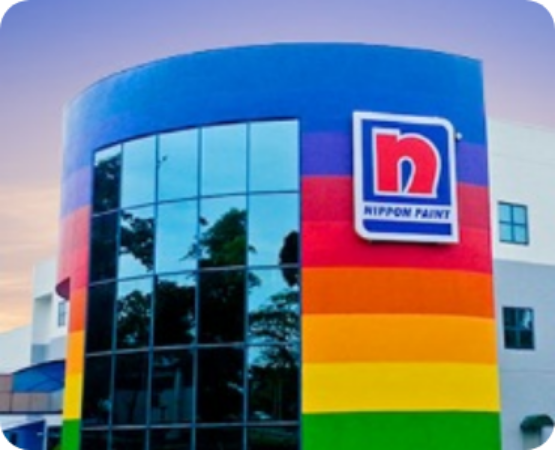
With over 100 years of experience in providing manufacturing protective coatings for various industries, we offer value you can trust.
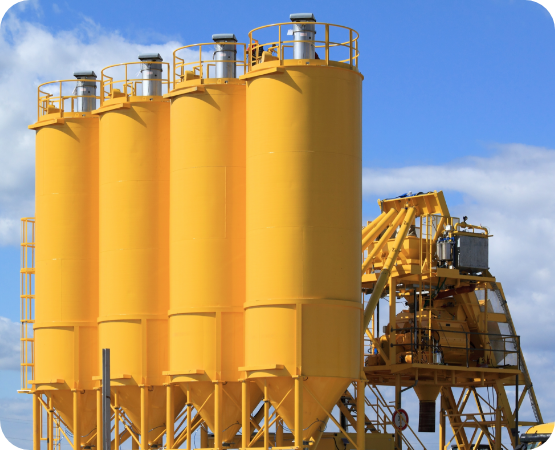
All our products feature high performance and showcase a variety of solutions, from conventional coatings to heavy-duty coatings, from heat resistance to chemical resistance.
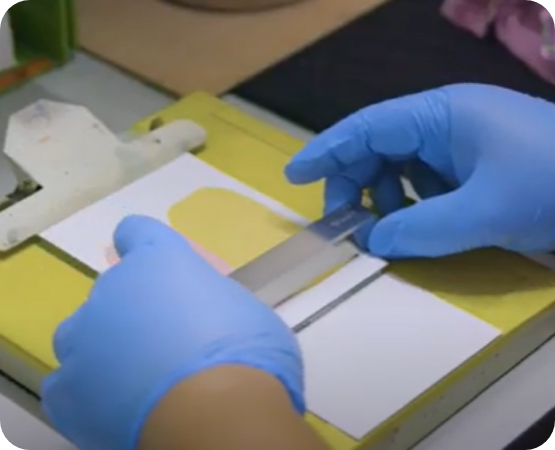
Our professional range complies with all industry standards, even surpassing some, to ensure total protection each time for our customers.
Provide comprehensive coating solutions with anti-corrosion and chemical-resistant paint that offers durability and long-lasting protection for all surfaces including factories and warehouses.
Find Out MoreProtect every surface of the infrastructure — including concrete and metal with Nippon Paint’s innovative protective coating products. Providing long-lasting protection against harsh weather, corrosion, high temperature and unpredictable conditions.
Find Out MoreEnsure that every piece of equipment is protected with protective coating products that offer durability without compromising aesthetics, business processes and productivity.
Find Out MoreWe have an extensive range of products specifically designed to provide long-lasting protection against corrosion for all valuable assets owned by the power industry.
Find Out MoreOur protective coating supports all your oil and gas assets by offering protection against corrosion, harsh environments and hazardous onshore operating conditions. With our high-performance products, you’ll get to reduce costs and safeguard every worker involved.
Find Out MoreISO 12944 has the best practices in protecting structural steel surfaces. It all starts by ‘Selecting the environment’ and ‘Selecting the lifespan’ to pick out your desired durability.
ISO 12944 has the best practices in protecting structural steel surfaces. It all starts by ‘Selecting the environment’ and ‘Selecting the lifespan’ to pick out your desired durability.
| Corrosivity Category | EXTERIOR | INTERIOR |
|---|---|---|
| C1 Very low |
- | Heated buildings with clean atmospheres, e.g. offices, shops, schools, hotels |
| C2 low |
Atmospheres with low level of pollution: mostly rural areas |
Unheated buildings where condensation can occur, e.g. depots, sports halls |
| C3 Medium |
Urban and industrial atmospheres, moderate sulfur dioxide pollution; coastal areas with low salinity | Production rooms with high humidity and some air pollution, e.g. food-processing plants, laundries, breweries, dairies |
| C4 High |
Industrial areas and coastal areas with moderate salinity | Chemical plants, swimming pools, coastal ships and boatyards |
| C5 Very High |
Industrial areas with high humidity and aggressive atmosphere and coastal areas with high salinity | Buildings or areas with almost permanentcondensation and with high pollution |
| Cx Extreme |
Offshore areas with high salinity and industrial areas with extreme humidity and aggressive atmosphere and subtropical and tropical atmospheres | Industrial areas with extreme humidity and aggressive atmosphere |
Note: Corrosivity categories can also be estimated by considering the combined effect of the following environment factors: yearly time of wetness, yearly mean concentration of sulfur dioxide and yearly mean deposition of chloride (see ISO 9223). The loss values used for the corrosivity categories are identical to those given in ISO 9223.
| Category | ENVIRONMENT | EXAMPLES OF ENVIRONMENT AND STRUCTURES |
|---|---|---|
| IM1 | Fresh water | River installations, hydro-electronic power plants |
| IM2 | Sea or brackish water | Immersed structures without cathodic protection(e.g. harbour areas with structures like sluice gates, locks or jetties) |
| IM3 | Soil | Buried tanks, steel piles, steel pipes |
| IM4 | Sea or brackish water | Immersed structures with cathodic protection(e.g. offshore structures) |
Note: For corrosivity category IM1 and IM3, cathodic protection can be used with a paint system tested accordingly
| Durability | YEARS TO FIRST MAJOR MAINTENANCE |
|---|---|
| Low (L) |
Up to 7 years |
| Medium (m) |
7 to 15 years |
| High (H) |
15 to 25 years |
| Very high (VH) |
More than 25 years |
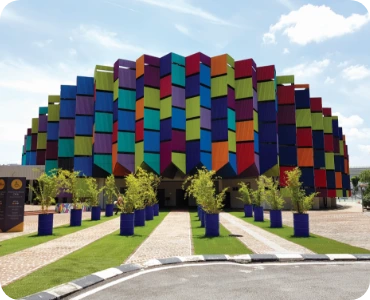
1M4U Youth Centre, Selangor
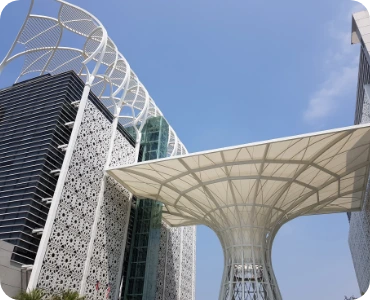
Bangunan Jakim, Putrajaya
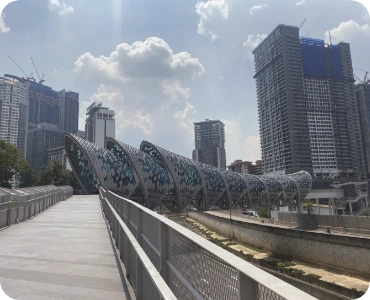
Saloma Bridge, Kuala Lumpur
Nippon Paint protective coatings are a type of coating that is applied to surfaces to protect against corrosion, rust, and other environmental factors that can weaken structures, create potential safety hazards, and result in high maintenance costs.
Nippon Paint protective coatings include Conventional Protective Coatings (single-pack coatings), Heavy-Duty Protective Coatings (2-pack coatings), Heat Resistance Coatings, and Chemical Resistance Coatings.
Nippon Paint protective coatings offer several benefits, such as corrosion resistance, chemical resistance, UV resistance, weathering resistance, and heat resistance for various environments, including immersion services, non-immersion, and even food-safe tank lining.
Nippon Paint protective coatings are suitable for many surfaces but are primarily applied to steel surfaces, such as structural steel, storage tanks (both internal and external), pipes, piles, vessels, and bridges.
The lifespan of a protective coating depends on several factors, such as the type of coating, the surface it is applied to, and the environment it is exposed to. Generally, protective coatings can last anywhere from a few years to several decades.
There are several methods for steel surface preparation, including solvent cleaning to remove wax, oil, and grease; power tool or wire brushing; and abrasive sandblasting to create a suitable surface profile (recommended 50 – 100 microns). For more information on suitable surface preparation, please refer to the Technical Data Sheet (TDS) or consult with our experts at faq 1-800-88-2663, or drop a note at https://professional.nipponpaint.com.my/contact-us.
In some cases, protective coatings can be applied over an existing coating if the surface is properly prepared. However, it is best to consult with a professional to determine if this is a suitable option.
The right protective coating depends on the type of surface, the environment it is exposed to, and the desired level of protection. For more information, please consult our experts at 1-800-88-2663, or drop a note at https://professional.nipponpaint.com.my/contact-us.
Nippon Paint protective coatings can be applied using various methods, including spraying (air spray and airless spray), brushing, and rolling. The application method will depend on the thickness, surface area, finishing of the surface being coated, the coating system, and the type of project (i.e., new construction or maintenance).
The types of protective coatings include acrylic, alkyd, epoxy, polyurethane, silicone coatings, and many more.
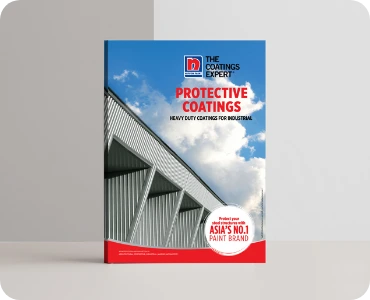
Download The Official Brochure
Browse through more in-depth product information and colour selections.
Download Now